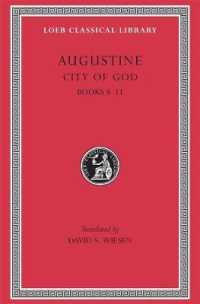- ホーム
- > 洋書
- > 英文書
- > Literary Criticism
Full Description
Reading Espionage Fiction: Narrative, Conflict and Commitment from World War I to the Contemporary Era probes the ways in which the struggles and loyalties of political modernity have been portrayed in the espionage story over the course of the twentieth and twenty-first centuries. Reading works by authors such as Somerset Maugham, Helen MacInnes, John le Carre, Sam E. Greenlee and Gerald Seymour as popular literature deserving of sustained attention, this book shows how these narratives have both created a modern genre and, at the same time, sought an escape from its limitations. Martin Griffin takes up the importance of plot and character and argues that, in this branch of fiction, the personal has always and ever been political.
Contents
Acknowledgements
Introduction: Revisiting Ramón Mercader, 1966
1. The Maugham Paradigm: Performing English Identity amid the Surges of History
2. The Past as Prologue: Antifascism and the Prophetic Mode in Ambler and MacNeice
3. "We'll Meet Again": War, Memories, and Loss in MacInnes and Garve
4. John le Carré and the Jews
5. The American Uncertainty: Genre and Borders in Charles McCarry and Don DeLillo
6. Race and Intelligence: African-Americans and the Secret Life
7. The Soldier's Song: Britain's Irish War in Gerald Seymour's Trilogy
8. Espionage Fiction and the Lost Adversary: Carlyle and Mathison
Works Cited
Index








